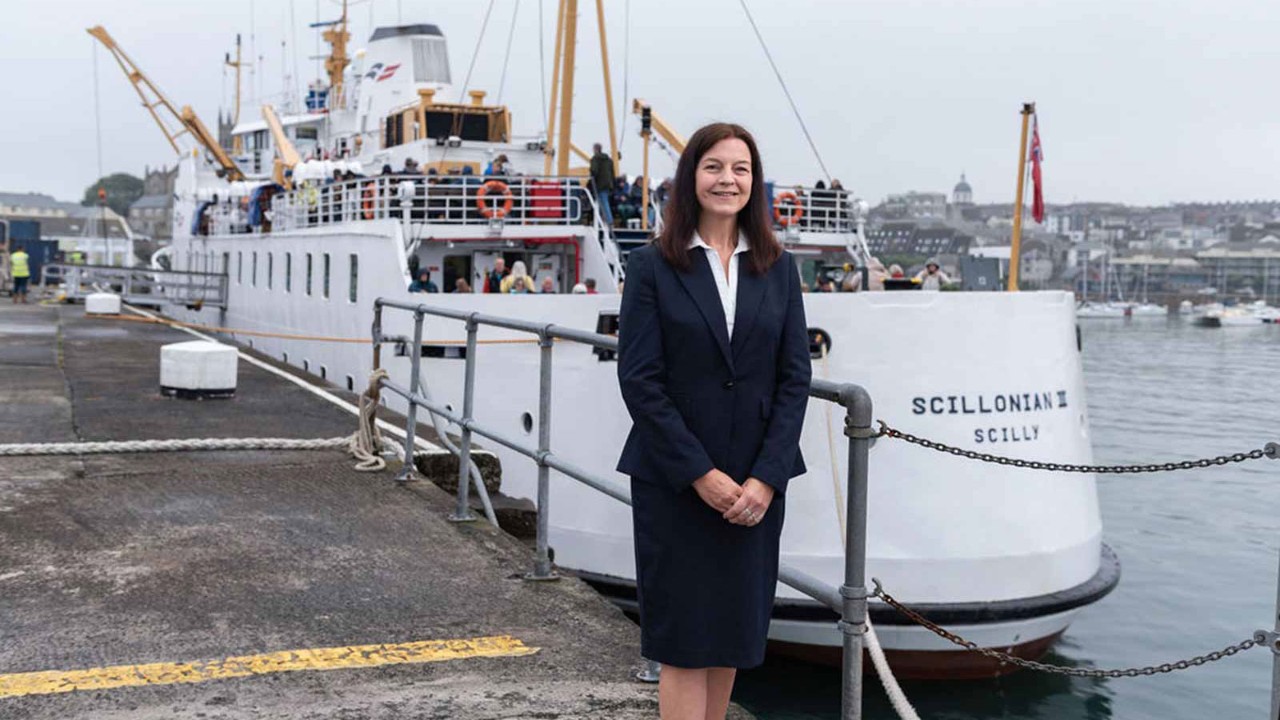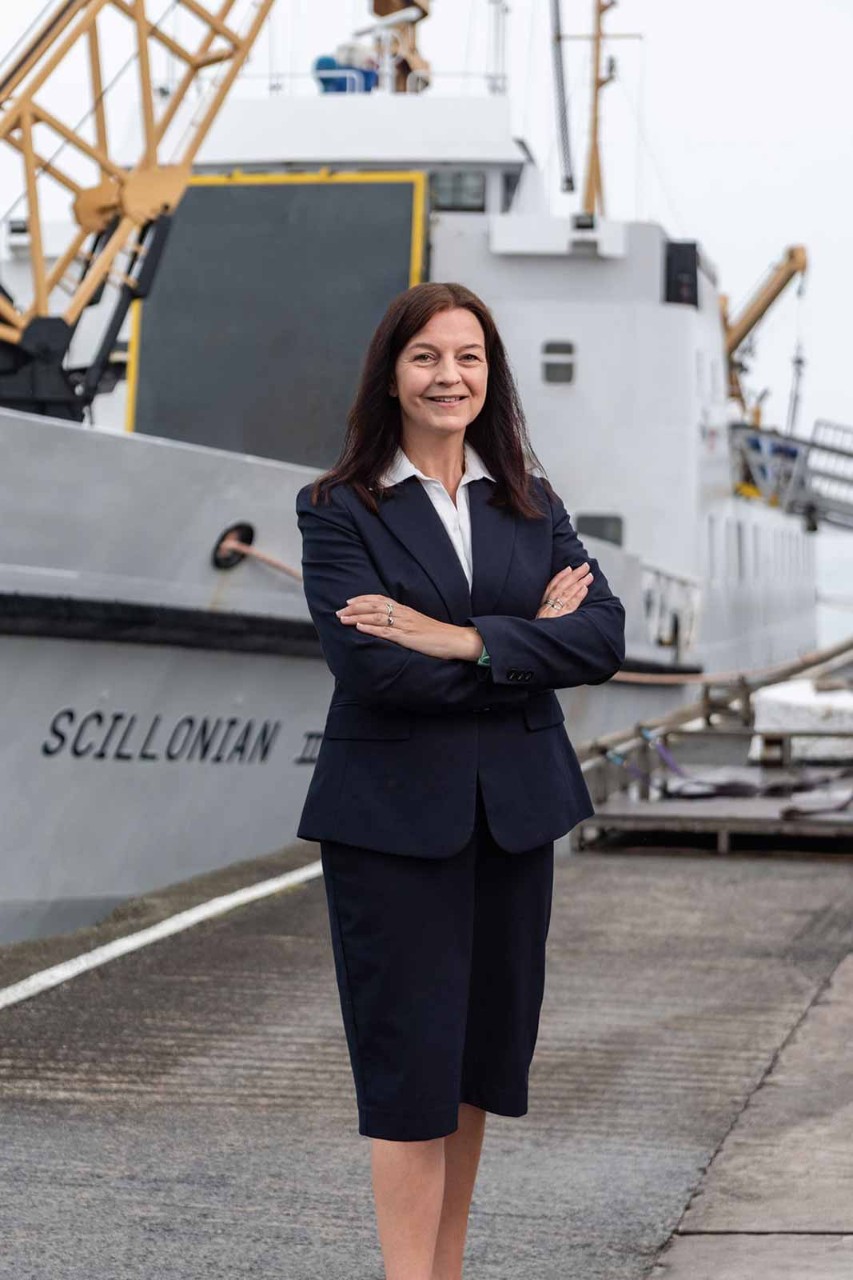
The Isles of Scilly, some 28 miles off the coast of Cornwall, are home to around 2,200 people. But over the summer months more than 100,000 tourists flock to the islands, attracted by beautiful scenery, wildlife, flora and a temperate climate. For more than a century, tourists and residents have depended on the Isles of Scilly Steamship Group (ISSG) to transport them safely back and forth, by sea or, more recently, air.
ISSG is very much a community enterprise, first established as the Isles of Scilly Steamship Company in 1920 when a group of islanders raised £20,000 in share capital to create a company that could provide a regular, reliable transport and cargo link to the mainland.
‘We are recognised as a lifeline link service, but we have to be self-supporting’
The first Steamship Company vessel was purchased in 1920 but replaced in 1925 by Scillonian, a steam-powered ferry equipped to carry 390 passengers. The company has played a key role in the Isles of Scilly’s evolution into a tourism-driven economy, with the sector now accounting for 85% of the islands’ income. The other main source of revenue, flower farming, is also dependent on ISSG’s services to transport more than 20 million stems to the mainland every year.
Complex challenges
The challenges of running a commercial enterprise that has such vital importance to the Isles of Scilly are complex, as ISSG’s CFO, Judith Piper FCCA, explains. ‘Our group of 11 companies ranges from shipping and aviation to property and logistics, and includes five ships, seven aircraft and an airport,’ she says. ‘We are one of west Cornwall’s biggest employers, with skilled employees including pilots, marine crew and engineers. We are recognised by the UK government as a lifeline link service, but we have to be self-supporting.’
As an essential lifeline transport service, ISSG was granted Covid-19 funding from the government during the pandemic in order to maintain services, but the group does not receive any regular subsidies.
‘We have to be in a strong financial position in order to keep running,’ Piper says. The company must meet the transport and freight needs of the Isles of Scilly’s permanent residents year-round, before ramping up its services over the holiday season to meet the extra demand from day-trippers and other tourists.
Belt and braces
The changeable weather off the Cornwall coast was a significant driver in ISSG’s decision to acquire Skybus, its aviation arm, in 1984. It began as a freight-only service but today offers scheduled passenger flights to the islands year-round from Land’s End and Newquay, as well as seasonal services from Exeter.
‘Shipping and aviation complement each other’

‘The truth is that shipping and aviation complement each other,’ Piper says. ‘When the weather is poor, we can offer our passengers an alternative means of transport, which adds to our resilience.’
But while ISSG’s shipping operations are profitable, generating the bulk of the group’s £2.95m pre-tax profits in 2024, aviation has been more challenging. The aviation business reported a loss of £200,000 in 2024 as a result of regulatory changes and a steep increase in landing fees at St Mary’s Airport.
Jonathan Hinkles, the former CEO of Loganair, was appointed in January to lead Skybus with the aim of returning the wholly owned subsidiary to sustainable profit. Extra services have been introduced from Newquay for the 2025 tourist season and the company has recently announced a major new contract to provide two aircraft to Aurigny Air Services of Guernsey. ‘The future of our aviation services looks bright,’ Piper says.
Ageing fleet
The major challenge for ISSG’s shipping operations, on the other hand, is the age of its fleet. The company is currently operating Scillonian III. The diesel-powered passenger ferry was launched in 1977 and is reaching the end of its life, as is the ageing freight ship Gry Maritha.
‘We knew we would have to replace these vessels, so for the past few years we have been working on strengthening our financial position, particularly in terms of cash,’ Piper says.
The work has enabled ISSG to put down a 20% cash deposit on a £40m-plus contract with the French shipbuilder Piriou to construct a new 600-passenger ferry, Scillonian IV, and a freight ship, Menawethan. The remainder – the biggest single investment in the company’s history – will be funded through a loan from Lombard NatWest.
‘Our expertise has kept us going for over a century’
CV
Before being appointed CFO, director and company secretary at Isles of Scilly Steamship Group in 2018, Judith Piper took up the following positions:
2010
Finance director, company secretary and acting MD, W Stevenson & Sons
2001
Group property finance manager, Unipart Group
1996
Financial and management accountant, South Western Ambulance Service NHS Foundation Trust
The new vessels are expected to be completed in 2026. ‘Scillonian IV will be able to carry more passengers, will be slightly faster, more energy efficient, and is future-proofed to adapt to new green technology. Menawethan will significantly increase freight capacity and be able to carry a small number of passengers all year round,’ Piper says.
Scillonian IV will feature roll and pitch reduction systems such as anti-roll fin stabilisers, and is designed using modern propulsion technologies that improve efficiency and reduce environmental impact.
‘It’s fantastic being part of such a big project that this company would only go through once in every one or two generations. The biggest challenge for me has been making sure that the company is in a strong enough position to take on that amount of debt.’
ISSG has been recognised for this forward-looking stance, recently being awarded ‘Business of the Year’ by Maritime UK . The award is presented to a company who can showcase outstanding business performance, strategic vision and a dedicated commitment to advancing the maritime sector in the UK.
More than a century after ISSG’s first ship provided a reliable link between the islands and Penzance, the company’s focus is on the future.



